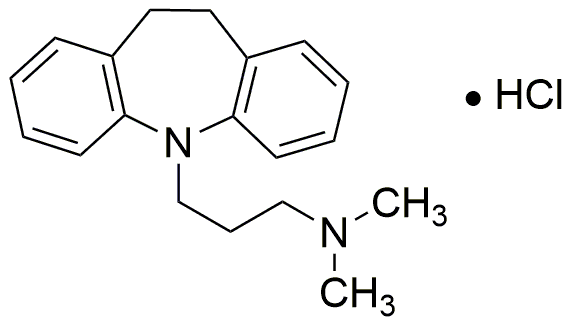Imipramine hydrochloride is widely utilized in research focused on:
- Depression Treatment: Commonly prescribed for major depressive disorder, it helps alleviate symptoms by balancing neurotransmitters in the brain.
- Anxiety Disorders: Effective in treating anxiety, it provides relief for patients suffering from generalized anxiety disorder and panic attacks.
- Chronic Pain Management: Used off-label to manage chronic pain conditions, it can help reduce pain perception and improve quality of life.
- Bedwetting in Children: Prescribed to treat nocturnal enuresis, it assists children in managing bedwetting by affecting bladder control.
- Research in Psychiatry: Serves as a valuable tool in clinical studies aimed at understanding mood disorders and developing new therapeutic strategies.
Informations générales
Propriétés
Sécurité et réglementation
Applications
Imipramine hydrochloride is widely utilized in research focused on:
- Depression Treatment: Commonly prescribed for major depressive disorder, it helps alleviate symptoms by balancing neurotransmitters in the brain.
- Anxiety Disorders: Effective in treating anxiety, it provides relief for patients suffering from generalized anxiety disorder and panic attacks.
- Chronic Pain Management: Used off-label to manage chronic pain conditions, it can help reduce pain perception and improve quality of life.
- Bedwetting in Children: Prescribed to treat nocturnal enuresis, it assists children in managing bedwetting by affecting bladder control.
- Research in Psychiatry: Serves as a valuable tool in clinical studies aimed at understanding mood disorders and developing new therapeutic strategies.
Documents
Fiches de données de sécurité (FDS)
La FDS fournit des informations de sécurité complètes sur la manipulation, le stockage et l’élimination du produit.
Spécifications du produit (PS)
Le PS fournit une description complète des propriétés du produit, notamment sa composition chimique, son état physique, sa pureté et les exigences de stockage. Il détaille également les plages de qualité acceptables et les applications prévues du produit.
Certificats d'analyse (COA)
Recherchez des certificats d'analyse (COA) en saisissant le numéro de lot du produit. Les numéros de lot et de lot se trouvent sur l'étiquette d'un produit, après les mots « Lot » ou « Lot de fabrication ».
Numéro de catalogue
Numéro de lot/série
Certificats d'origine (COO)
Ce certificat d'exploitation confirme le pays dans lequel le produit a été fabriqué, et détaille également les matériaux et composants utilisés et s'il est issu de sources naturelles, synthétiques ou autres sources spécifiques. Ce certificat peut être requis pour les douanes, le commerce et la conformité réglementaire.
Numéro de catalogue
Numéro de lot/série
Fiches de données de sécurité (FDS)
La FDS fournit des informations de sécurité complètes sur la manipulation, le stockage et l’élimination du produit.
DownloadSpécifications du produit (PS)
Le PS fournit une description complète des propriétés du produit, notamment sa composition chimique, son état physique, sa pureté et les exigences de stockage. Il détaille également les plages de qualité acceptables et les applications prévues du produit.
DownloadCertificats d'analyse (COA)
Recherchez des certificats d'analyse (COA) en saisissant le numéro de lot du produit. Les numéros de lot et de lot se trouvent sur l'étiquette d'un produit, après les mots « Lot » ou « Lot de fabrication ».
Numéro de catalogue
Numéro de lot/série
Certificats d'origine (COO)
Ce certificat d'exploitation confirme le pays dans lequel le produit a été fabriqué, et détaille également les matériaux et composants utilisés et s'il est issu de sources naturelles, synthétiques ou autres sources spécifiques. Ce certificat peut être requis pour les douanes, le commerce et la conformité réglementaire.


